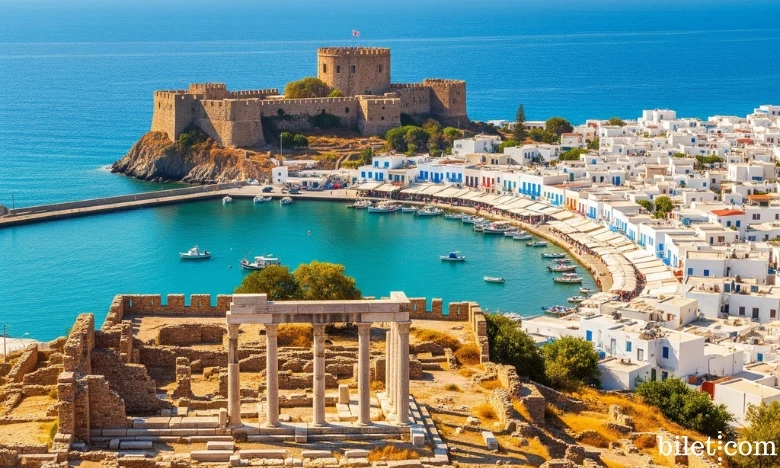Origin of the Name: The Mysterious History of the Word "Kos"
The origin of the name Kos remains a mystery in the mists of ancient times, but linguists and historians have tried to shed light on it with various theories. One of the most widely accepted approaches is that the island was called "Koa," "Coos" or "Cos" in ancient times.-
A Name Comes from Nature? Some researchers believe that the name evolved from the word "carcinos" (Greek: καρκίνος), a type of crab that was abundant on the shores of the island at the time. Another possibility is that it may be related to "kissos" (Greek: κισσός - ivy), which grew on the island and was an important plant in ancient times. These theories seem plausible when you consider the fertile soil and rich flora of the island.
-
Carian Connection: Kos is known for its proximity to the ancient Carian region. It has been suggested that the island's name may be derived from a Carian word or the name of a Carian god.
-
A Mythological Figure? According to another legendary narrative, the island took its name from Queen Kos, the daughter of Triopas and wife of Merops.
Kos in the Heart of Mythology: Gods, Heroes and Legends
The island of Kos has served as a natural plateau for some of the most colorful and dramatic stories of Greek mythology.-
Hercules (Heracles) and the Battle of the Giants: The son of Zeus, the king of the gods, the invincible hero Hercules, came to Kos. According to legend, Hercules, who returned victoriously from the Trojan War, was caught in a violent storm sent by the goddess Hera and was dragged to the shores of Kos with his ship. The people of Merope, the inhabitants of the island at that time, thought Hercules and his friends were pirates and attacked them. In the ensuing fight, Hercules killed the king of Merope, Eurypylos. Another version tells that Hercules fought with giants on the island. These myths emphasize the strategic importance and strong character of Kos in ancient times. The existence of temples and altars dedicated to Hercules on the island is an indication of how widespread this cult was.
-
Asklepios and the Sacred Place of the God of Healing: When Kos is mentioned, one of the first mythological figures that comes to mind is undoubtedly the God of Healing, Asklepios. Asklepios, the son of Apollo, was so skilled in the art of medicine that he could even resurrect the dead. The island of Kos was one of the most important centers of the Asklepios cult, and the most magnificent ancient ruin on the island, Asklepion , was dedicated to him. This place was not only a temple, but also one of the most advanced hospitals and medical schools of the ancient world. According to legend, the priests of Asklepios, descendants of Asklepios, treated patients here, passed down medical knowledge from generation to generation, and taught students the subtleties of the art of healing. It is thought that Asklepion reflects a holistic understanding of healing with its terraced structure, sacred springs, temples, patient rooms, and library.
Witness to History: Hippocrates' Homeland and the Cradle of Civilizations
The brightest star of Kos Island in world history is undoubtedly Hippocrates (460 BC - 370 BC), who is considered the "Father of Medicine." Hippocrates, believed to be a descendant of Asclepiades, was born in Kos and received his medical education here.-
Hippocrates and the Revolution in Medicine: Hippocrates revolutionized the understanding of medicine by proposing that diseases were not caused by the wrath of the gods or evil spirits, but by natural causes such as environmental factors, nutrition and lifestyle. He brought scientific observation, patient records, and methods of diagnosis and prognosis (predicting the course of a disease) to medicine. Most importantly, he established a moral framework for the profession with the "Hippocratic Oath", which determines the ethical rules of the medical profession and is still taught in medical schools today. The principle of "First do no harm" (Primum non nocere) is one of the cornerstones of his medical philosophy.
-
The Golden Age of Kos and Beyond: During the time of Hippocrates, Kos experienced its golden age as a center of science and culture. Asklepion became a place where patients seeking healing flocked not only from the Aegean but from all over the Mediterranean.
- Ancient and Classical Periods: Colonized by the Dorians in the 11th century BC, the island joined the Athenian Naval League, but later sided with Sparta. Entering the Hellenistic period with the conquests of Alexander the Great, Kos became an important naval power and trade center along with Rhodes.
- Roman and Byzantine Domination: Kos maintained its autonomy during the Roman Empire and continued its importance as a respected holiday and healing place. During the Byzantine period, it became a bishopric center, but went through difficult times with Arab raids and earthquakes.
- Knights' Period: Captured by the Knights of St. John (Knights of Rhodes) in 1315, Kos became an important part of a Christian defense line against the Ottoman Empire. The magnificent Neratzia Castle in the island's harbor and Antimachia Castle in the interior are the most important legacies of this period. The Knights ruled the island for nearly two centuries.
- Ottoman and Italian Periods: Conquered by the Ottoman army under the command of Suleiman the Magnificent in 1523, Kos remained under Ottoman rule for nearly 400 years. During this period, mosques, baths and fountains were built on the island; Gazi Hasan Pasha Mosque and Defterdar Mosque are good examples of this. Occupied by Italy during the Tripoli War in 1912, Kos was one of the Twelve Islands and was annexed to Greece by the 1947 Treaty of Paris.
More to Discover in Kos: From History to Nature, From Taste to Entertainment
Stripping away the depths of its name and mythology, Kos offers you countless experiences that will create unforgettable memories:-
Asklepion: Visit one of the most important healing centers of the ancient world and feel the spirit of Hippocrates.
-
Neratzia Castle (Knights' Castle): Discover this historical structure standing tall against the blue of the Aegean at the entrance to the port and travel back to the time of the knights.
-
Hippocrates Tree: Take a breather under the shade of the centuries-old plane tree in the centre, where Hippocrates is believed to have taught his students. (Although the age of the current tree is debatable, it has great symbolic value.)
-
Ancient Agora and Roman Odeon: Stroll through the ruins of once vibrant centers of trade, social life and art, while Casa Romana is a restored Roman villa that showcases the grandeur of the period.
-
Therma Beach (Empros Thermes): Relax at this natural spa, famous for its volcanic hot waters mixed with sea water.
-
Zia Village: An authentic mountain village, especially famous for its sunset views, full of traditional architecture, cute taverns and local produce shops.
-
Kefalos and Kardamena: Popular holiday resorts known for their golden sands, vibrant nightlife and water sports. Beaches such as Paradise Beach offer a corner of paradise in the south of the island.
-
Antimachia Castle: Another impressive castle from the Knights' period, located inland.
-
Local Delicacies: Be sure to taste fresh seafood, local olive oil, Kos honey, wines (especially dessert wines) and cheese aged in wine called "krasotiri".
Now, what are you waiting for to follow in the footsteps of Hippocrates, listen to the whispers of legends, witness the past of the knights and have an unforgettable holiday experience in the warm atmosphere and deep blue waters of Kos? This land of historical and natural beauties is waiting to be discovered!







